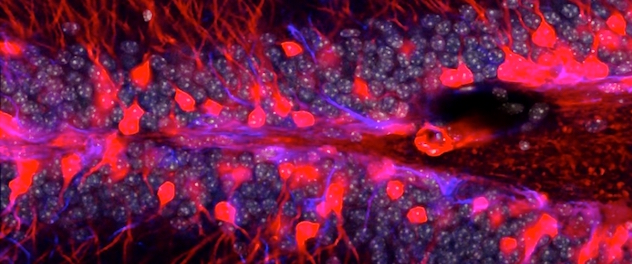 Preserving neurological growth and function
Preserving neurological growth and function
The hippocampus is one of the few brain regions where new neurons (red) are born throughout life. These not only are important for learning and memory but also are impacted by neurological diseases and many cancer therapies. Research in the department helps preserve neurogenesis and cognitive function in people with neurological diseases.
Overview
Neurosurgery investigators at Mayo Clinic are dedicated to advancing patient care through cutting-edge research spanning from discovery science and translation to clinical care. Inspired by our patients, Mayo Clinic researchers aim to improve patient care through a multifaceted and multidisciplinary approach, including:
- Basic science research. Several National Institutes of Health-funded laboratories within the department study and model human neurological diseases to discover tomorrow's therapies.
- Clinical studies. Neurosurgery clinicians and researchers at Mayo Clinic perform hundreds of clinical trials to translate new findings from bench to bedside. Find neurosurgery-related clinical trials.
- Informatics. Scientists' efforts to harness and advance informatics technology through new analytic tools and machine learning allows epidemiologic and individual patient data to yield increasingly individualized therapies.
- Neural engineering research. Researchers are developing new devices and technology for advanced management of neurological diseases.
- Outcomes research. Investigators' rigorous attention to how current therapies impact outcomes and quality of life continually refines and improves patient care.
Highly collaborative research efforts span Mayo Clinic's campuses in Phoenix/Scottsdale, Arizona; Jacksonville, Florida; Rochester, Minnesota; and dozens of collaborating institutions throughout the world. Collectively, this work enables the neurosurgery researchers at Mayo Clinic to pioneer technology aimed toward prevention and treatment of stroke, epilepsy, brain tumors, injuries of the brain and spinal cord, and neurodegenerative diseases.
Specific areas of neurosurgery research excellence at Mayo Clinic include:
- Awake brain surgery
- Brachial plexus and peripheral nerve disorders
- Cerebrovascular and skull base neurosurgery
- Epilepsy
- Informatics and data science
- Neural engineering
- Neuro-oncology
- Regenerative neuroscience
- Spine and spinal disorders
To learn more, explore laboratories and faculty in Mayo Clinic's Department of Neurologic Surgery.
Educational activities
Faculty members in the department train and mentor residents and fellows in Mayo Clinic School of Graduate Medical Education's neurosurgery training programs.